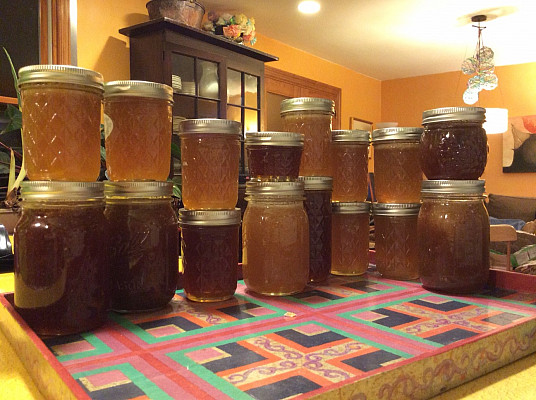
Harvesting Honey, Sustainability Students Get Their Hands Sticky
“Harvesting honey provided our students with a hands-on educational experience directly related to sustainability programming on campus, but also related to sustainable food production writ large,” said Spencer. “Honeybee health is an issue that we all need to be concerned about because of the vital role bees play in our food systems. This is one of the reasons that our programming is so important: our campus is a living laboratory for sustainability issues that all Ursinus students will be dealing with at one level or another after they leave campus.”
Unfortunately, this past fall all of the bees on the organic farm died, said Alana Lorraine ’16 (2015 Farm Co-Director). “However we had eight frames from the beehives filled with honey that we harvested on Sunday and ended up with over 20 mason jars full of both dark honey and a lighter colored honey. Each had distinct flavors.” The honey was distributed to faculty and staff on campus who have supported the efforts of the organic farm, said Hoover.
Earlier this winter, Hoover took the honey frames from the beehives at farm after the hives died. Beehive loss is an increasingly common occurrence internationally. One reason Ursinus keeps bees is to combat that loss through education and proper bee keeping practices. Most hive loss is the result of two factors, either Colony Collapse Disorder (CCD) or a harsh winter. CCD is a mysterious problem in which entire colonies die off despite being relatively healthy. Many scientists contribute this collapse to high uses of pesticide and other harsh chemicals used in farming. In addition, the commercial handling of bees, including transporting hives over thousands of miles, might be contributing to their frailty.
Honeybees play a crucial role in our environment and food system. Approximately one in every three bites of food that we consume depends on bees for pollination, and honeybees contribute about $15 billion of value to U.S. agriculture – the crops they pollinate include apples, almonds, berries, cucumbers, and pumpkins. Bee populations have experienced significant declines in recent. Research into the causes of pollinator decline is ongoing, but likely factors include global warming, exposure to pesticides and industrial chemicals, habitat loss, nutritional deficiencies, and parasites and diseases.
Honeybees that came to the United States from Europe in the 1600s are an introduced, non-native species, said Ursinus Professor of Biology James Sidie, whose thesis was on honeybee neurobiology and behavior. “Nevertheless they have become integrated into the fabric of North American ecology and agriculture,” said Sidie.
The list of insect-pollinated crops constitutes 15 percent of human direct dietary input and most of the diversity in our diet. The number of commercially managed honeybee colonies in the U.S. has declined from 6 million in 1947 to 4 million in 1970, 3 million in 1990, and only 2.5 million in 2014, according to a June 2104 White House press release.
Another reason a colony might die is from a particularly harsh winter. Bees stay warm by balling up inside their hives and feeding on their honey and each other’s warmth. Bee biology and proper apiary management can help prepare hives for winters. Despite having plenty of honey, the two colonies at Ursinus’s Organic Farm were not large enough to stay warm through late fall and early winter. Ursinus will be purchasing two new hives this spring from a local apiary and will continue will work to address the issues that arose with the bees this fall. The College Farm will continue working with bees in the foreseeable future.
The Organic Farm is located on 2.5 acres of land on 9th Ave. right next to Hunsberger Woods. A wide variety of herbs, vegetables and fruit bearing bushes, including raspberries and blueberries grow there in season. Additionally, the farm raises chickens and bees, and has 20 raised beds available to members of the Ursinus community to raise their own vegetables or flowers.
The farm program serves as hands-on space where students learn about basic agricultural practices such as crop planning, small farm economies, food policy, and animal husbandry. On any given day, a number of students can be spotted volunteering their time in the field or reading in the peaceful shade of a Pin Oak.
Other students who participated in the honey harvesting event were Sydney Godbey ’18 (2015 Farm Co-Director), Olivia Keithly ’16 (Communication Fellow), Connor Murphy ’15 (Bikeshare Fellow), Axel Gonzalez ’16 (2014 Farm Co-Director), and Grace Barter ’16 (2014 Farm Co-Director).
